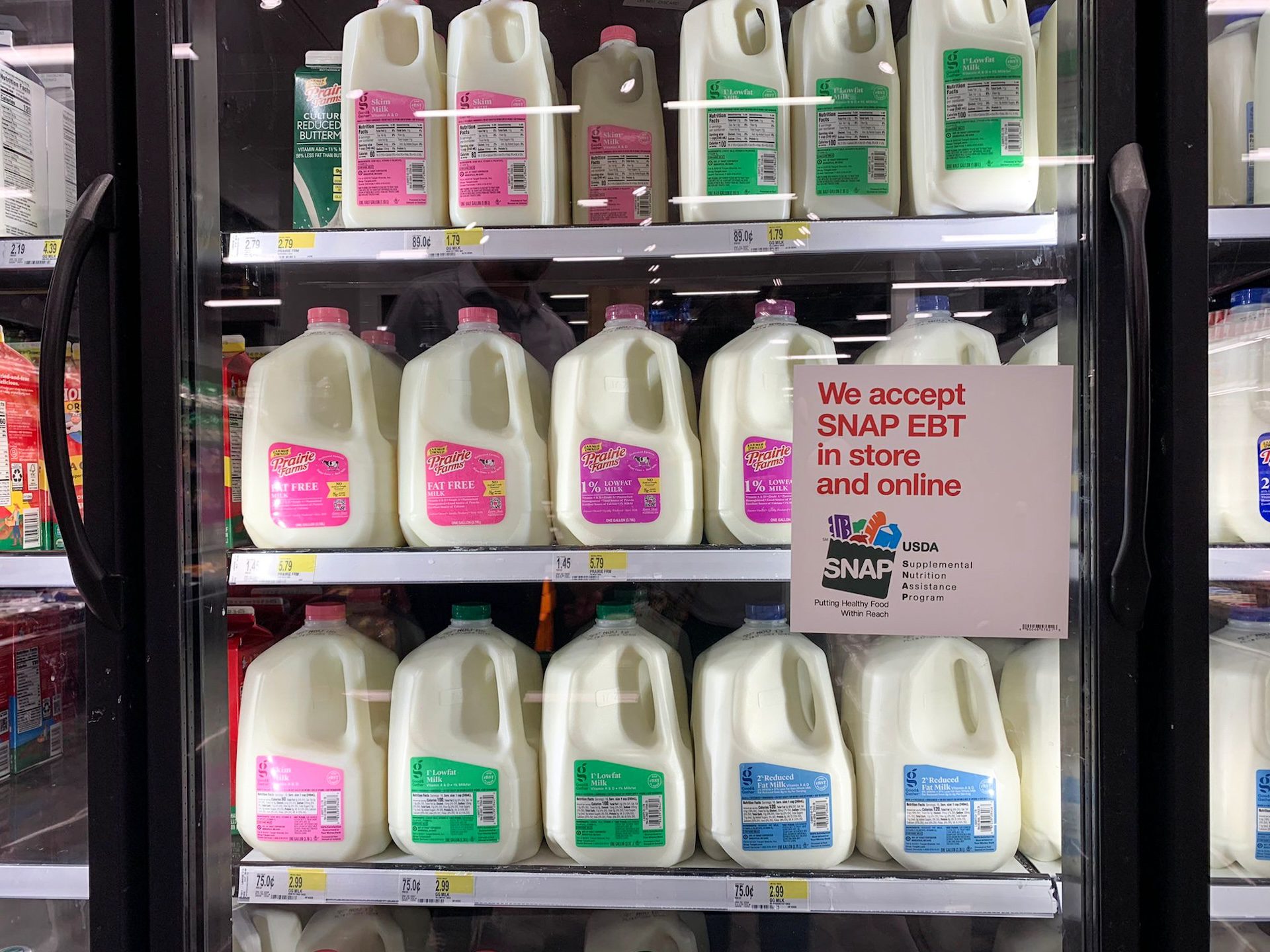 Aydalí Campa/Borderless Magazine
Aydalí Campa/Borderless MagazineLa ayuda alimentaria federal expiró el fin de semana debido al cierre del gobierno. He aquí cómo SNAP se verá afectado y lo que esto significa para las familias inmigrantes.
It’s been over a month since the federal government shutdown — tying with the longest shutdown in U.S. history.
Over the weekend, an estimated 40 million people lost access to federal food assistance benefits, including the Supplemental Nutrition Assistance Program, commonly known as SNAP.
President Trump’s administration announced that SNAP would be cut off on Saturday as part of the government shutdown amid the impasse between Republican and Democratic leaders.
Noticias que ponen el poder en el punto de mira y a las comunidades en el centro.
Suscríbase a nuestro boletín gratuito y reciba actualizaciones dos veces por semana.
However, two federal judges ruled last week that the government needed to restore SNAP benefits. In response, the Trump administration said it would agree to only pay half the amount beneficiaries usually get and the payment would be delayed weeks or even months.
Experts say the shutdown will have the greatest impact on low-income families.
“These are individuals who are living paycheck to paycheck — veterans, older adults, people with disabilities — who are counting on this fund,” Gina Plata-Niño, interim director for SNAP at the Food Research and Action Center, told CBS News.
For immigrants, however, accessing federal aid is challenging. Citizenship or immigrant status, along with your income, determines whether or not you can apply for food benefits programs. (Read our guide to know whether you qualify here.)
Borderless compiled a guide to help you understand which federal assistance programs have been impacted and what this means for immigrants.
What caused the government shutdown?
Republicans and Democrats have been unable to pass a bill funding the government since the previous federal budget expired on Oct. 1. Republicans, who hold a majority in both the Senate and the House of Representatives, have failed to garner enough support in the Senate to pass legislation reopening the government.
Democrats have called for the bill to reverse Trump’s cuts to Medicaid, a health program that serves low-income, disabled and elderly people. They have also called for the extension of tax credits that make health insurance more affordable for millions of Americans. The Affordable Care Act subsidies are set to expire at the end of the year.
Republican leaders said they are unwilling to make concessions on specific healthcare plans.
The shutdown has created uncertainty for several federally funded programs and workers across the country. Around 750,000 employees are on unpaid leave nationwide.
The final vote failed to move forward for the 13th time last month.
What federal assistance programs will be impacted?
Key federal assistance programs are running out of funds as the shutdown continues into November. Millions of low-income families who rely on assistance programs are now facing uncertainty with a looming lack of federal funding.
The following benefits could be affected by the shutdown:
Supplemental Nutrition Assistance Program (SNAP)
Millions of Americans are preparing for cuts to SNAP benefits. The program has been critical to food assistance in low–income families, but some states have begun warning those who rely on SNAP that there will be “insufficient funds” to pay full November SNAP benefits.
SNAP serves approximately 42 million low-income individuals, providing them with monthly funds to purchase groceries. Approximately 12% of the U.S. population received benefits from the federal food assistance program, SNAP, in 2024. But as the government shutdown continues, 1.9 million people in Illinois could lose SNAP benefits.
“The government has deemed all immigration enforcement to be an essential priority,” said Aimee Mayer-Salins, managing appeals attorney at Amica Center for Immigrant Rights. “Meanwhile, a lot of Americans can’t even figure out where their next meal is coming from because of the government shutdown.”
Some states, including California, New York and Illinois sued the Trump administration last week over the withholding of funds from SNAP, claiming the move was unlawful. The Department of Agriculture declined to pull from around $5 billion in contingency funds to continue the program despite the shutdown.
The Trump administration announced Monday that it will partially fund SNAP following a ruling by two judges last week, requiring the government to continue funding the program. Officials said payment will be delayed and could take weeks or even months.
Women, Infants and Children (WIC)
Similarly, the Special Supplemental Nutrition Program for Women, Infants and Children provides free, healthy foods, breastfeeding support, nutrition education and health resources to new mothers and families.
Currently, federal funds can keep WIC functioning for another two to three weeks. However, seven million people could lose access if the shutdown continues.
With millions of families at risk of losing funding, WIC officials urged Congress to reach a resolution before funding runs out.
“Without a swift resolution, millions of pregnant women, new mothers, infants, and young children could lose access to the nutritious foods and health support they need,” the National WIC Association said in a statement.
Medicare and Medicaid
Medicare or Medicaid coverage won’t be directly impacted by the government shutdown, but with fewer government workers, processing requests could potentially impact care.
Telehealth services, which are offered to people on Medicare and developed during the pandemic to allow patients to see doctors from home, expired shortly after the shutdown.
Head Start
Head Start serves children younger than six from low-income families and provides free support services, including early education, health screenings, and nutritious meals. The 60-year-old education program is facing budget constraints because of the government shutdown.
The program has served over 40 million children and families since its start in 1965. Over 65,000 children and families across the country will need to find alternative childcare options as the shutdown continues into November.
While Chicago-area programs are currently safe, funds for those overseen by the city of Chicago are expected to run out by Dec. 1.
Editor’s note [10/04]: We’d like to hear from you if you rely on benefits like SNAP, Head Start, WIC or Medicaid and are experiencing the impact of the government shutdown. Please contact reporter Aydali Campa at [email protected].
Tara Mobasher es reportera y redactora del boletín de Borderless Magazine. Envía un correo electrónico a Tara a [email protected].


